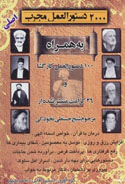کلیپ های دیدنی
مشاوره و خانواده
با توجه به ترک خود ارضایی عوارض آن هنوز در من هست چگونه آن را برطرف کنم ؟
13-08-1399 بازدید:5661 مباحث جنسی و زناشویی همکار پاسخگو

آیا بخاطر وسواس فکری توهین به مقدسات گناه دارد؟
19-05-1398 بازدید:5365 مشکلات و اختلالات روانی همکار پاسخگو
آیا از طریق اینترنت می تواند ازدواج موقت کرد ؟
پرسش: با سلام من 22 سالمه از پارسال با يه دختري در…
از زندگی سیر شدم و آرامش ندارم چکار کنم؟
پرسش : سلام..خواهش ميکنم يه راهي جلو روم بذارين من از…
من از تاریکی شب به دلیل توهمات ذهنیم میترسم چکار کنم؟
پرسش: من وقتي در خانه تنها مي شوم و هوا تاريك…
شب ها كابوس فيلم هاي مبتذل را که قبلا نگاه می کردم میبینم!
پرسش: (در خصوص توبه از ديدن فيلم هاي مبتذل) در اين…
بنده متاهلم و در اینترنت با دختری آشنا شدم که کارمون به گناه کشید!
پرسش: بنده یک مشکلی دارم که می خواستم از شما راهنمایی بخواهم…
جوانی هستم که از زندگی خسته شده و احساس پوچی می کنم!
پرسش: راستش نمی دانم از کجا شروع کنم. 20 ساله هستم…
از طریق اینترنت با پسری آشنا شدم و مدتها با هم در ارتباط بودیم!
پرسش:من دانشجوی ارشد رشته حقوق تقریبا حدود 1 سال پیش…
چرا خانواده ها عاشق شدن را برای جوانان (دختر) بد می دانند؟
پرسش: چرا خانواده ها عاشق شدن را برای جوانان (دختر) بد…
چگونه دیدن فیلم های مبتذل را ترک کنم؟
پرسش: با سلام به حضور حضرت عالي اگرخاطرتان باشد ،من قبلا هم…
با شوهرم قبل از ازدواج رابطه نانشروع داشتم!
پرسش: با سلام من زنی 25 ساله هستم.حدود 1 سال است…
اگر دختری عاشق غیر هم جنس خود...؟
پرسش: اگر دختری عاشق غیر هم جنس خود شود البته نه…
اگر نتوانيم جلو شهوت خود را بگيريم ، چه بايد بكنيم ؟
پرسش: اگر نتوانيم جلو شهوت خود را بگيريم ، چه بايد…
جوانی هستم 21 ساله اهل تهران و تمایل زیادی به سکس دارم
پرسش: من جوانی هستم21 ساله اهل تهران وتمایل زیادی به سکس…
نمي دونم چرا از ازدواج مي ترسم؟!
پرسش: سلام مشکل من اینه که نمي دونم چرا از ازدواج مي…
چرا به زن مطلقه با یک چشم و دید دیگری نگاه می کنند؟!!
پرسش: سلام حاج آقا من یک خانم مطلقه هستم و سوالم اینه…
چرا مخالف رابطه دختر و پسر هستید؟؟!!
پرسش: سلام حاجاقا چند تا سوال داشتم ممنون میشم جواب بدید. 1 چرا…
شب زفاف یا حجله چه شبی است و زن و مرد چکار باید بکنند؟
پرسش: شب زفاف و یا شب حجله که در روایات هم…
چه زمانی برای رابطه جنسی با همسر مناسب است؟
پرسش: چه زمانی برای رابطه جنسی با همسر مناسب است؟ و…
دختری که در سن جوانی و نوجوانی دچار شهوت می شود چه باید بکند؟
پرسش:دختری که درسن جوانی و نوجوانی دچار شهوت می شود…
می خواهم خوب باشم ولی دوست دخترم نمی گذارد!!
پرسش: به دلیل که من مدتی است به شهر آمده ام…
وقتی که عصبانی می شوم دیگر هیچ چیزی دست خودم نیست چکار کنم؟
پرسش: سلام آقای پاسخگو من دارای اخلاق بدی هستم وبا همه خواهر…
من دحتر قبلی نيستم و به يك دختر فاسد تبديل شده ام!
پرسش: من دختري هستم 14ساله من اول دختري سنگين بودم اما…
در مورد وسواسی و راه درمان آن توضیح بفرمایید؟
پرسش: وسواسی چیست و برای درمان آن چه راهکارهایی معرفی می…
خواسگارم بد اخلاق است آیا جواب مثبت بدهم؟
سوال: آیا به پسر بد اخلاق که خواستگاری کرده جواب مثبت…
اخلاقم رُك گفتن است اما حق ميگويم و شوهرم مخالف رفتارم است.
پرسش: اخلاقم رُك گفتن است اما حق ميگويم و شوهرم…
خواستگارم دو ازدواج و یک نامزدی ناموفق داشته جواب مثبت بدم؟
پرسش: خانمی هستم که در گذشته، یک ازدواج_ناموفق داشتم. در حال…
شوهرم گلایه میکنه که چرا همیشه به حرفم گوش میدی!
پرسش: من 20 سالمه 1 ساله ازدواج کردم شوهرم 22 سالشه…
دختر 36 ساله ای که چهره زیبایی ندارد چکار کند؟
پرسش: با سلامدختر 36 ساله اي که مومن و حافظ قرآن…
اختلاف سني پسر با دختر تا چه مقدار ايده آل است؟
پرسش: ميخواستم بدونم ايا ازدواج با دختري که سنش با پسر…
چگونه از انحرافات جنسى به دور باشيم؟
پرسش: در فاصله سنّ بلوغ تا هنگام ازدواج چگونه از انحرافات…
بعضی وقتا اعصابم میریزه بهم با نامزدم بدرفتار میکنم چطورخودمو کنترل کنم؟
پرسش: سلام ببخشید ی سوالی داششتم من دختری۱۸سالم ۷ماهه عقدکردم بعضی…
نقش خانواده در تربيت فرزندان چیست؟
پرسش: نقش خانواده در تربيت فرزندان چیست؟ پاسخ: با سلام و ادب خدمت شما…
نامزدم مي خواهد در كوچه و خيابان آرايش كرده و كمي از موهايم را از روسري بيرون بگذارم!
پرسش: من تا قبل از نامزديم بسيار با حجاب بودم. البته…
چرا برخی مردان در کنار همسرشان آرامش نمی یابند؟
پرسش: قرآن مجيد وجود زن را كانون محبّت و…
علت و شرايط تحقق صيغه چيست؟
پرسش: علت و شرايط تحقق صيغه چيست؟ پاسخ:…
چرا بین دو هوو همیشه اختلاف وجود دارد؟
پرسش: چرا بين دو همسر(زن) با وجود مشروعيّت ازدواج…
پرسش و پاسخ
آیا کسی که شراب بنوشد تا چهل روز نماز و عباداتش قابل قبول نیست ؟
13-08-1399 بازدید:2880 مسائل متفرقه نماز همکار پاسخگو

اذان در جامعه اسلامی نماد چیست ؟ و چرا فقط سه بار در روز تکرار می شود ؟
پرسش: اذان در جامعة اسلامی نماد چیست و…
حکم مشروبات الکلی از دیدگاه اسلام چیست ؟
پرسش: حکم مشروبات الکلی از دیدگاه اسلام چیست…
چرا با این همه ظلم و ستم در جهان امام زمان (عج) ظهور نمی کند ؟
پرسش: چرا با این همه ظلم و ستم…
اگر نگاه به نامحرم گناه است چرا در فیلمهای خارجی زنهای بدون حجاب را نشان میدهند؟
پرسش: چرا میگویند نگاه کردن به نامحرم گناه…

با چه شیوه هایی میتوانیم پیرو انبیاءالهی باشیم ؟
پرسش : چه راه و روشی را پیبگیریم…
چرا زرتشتیان به اعتقاداتشان پایبند هستند ولی مسلمانان نه؟
پرسش : چرا در دین زرتشت گفتار نیک،…
چرا معانی دقیق آیات قرآن مشخص نیست و نیاز به تفسیر دارد ؟
پرسش : به چه دلیل تا تفسیرهای متعدد…
آیا جهت انجام هر کار نامشروعی می توان صیغه جاری کرد ؟
پرسش : اهمیت صیغه کردن در چیست؟ با…
اگر پیامبر (ص) عرب زبان نبود آیا قرآن باز هم به زبان عربی نازل می شد؟
پرسش : اگر حضرت محمد(ص) زبان دیگری به…
آیا در بین پیامبران ،پیامبر خشن هم وجود دارد؟
پرسش : پیامبران به مهربانی معروف میباشند آیا…
با توجه به محاسن روزه آیا معایبی هم در آن هست ؟
پرسش : روزه محاسن بسیاری دارد، آیا این…
جنس خداوند از چه چیزی می باشد و خدا چیست؟
پرسش : جنس خداوند از چه چیزی میباشد…
معنی خدا چیست؟چرا خداوند از حروف دیگر استفاده نکرده است؟
پرسش : تعریف لغوی خدا چیست و چرا…
خال کوبی ابرو (تاتو )از نظر شرعی برای وضو و غسل چه حگمی دارد ؟
پرسش : خالکوبی ابرو (تاتو) از نظر شرعی…
شنیدن صدای زنان در مراسم عزاداری و مولودی چه حکمی دارد ؟
پرسش : شنیدن صدای زنان در مراسم عزاداری…
در چه صورتی امر به معروف و نهی از منکر واجب می شود؟
پرسش : در چه صورتی امر به معروف…
چرا در ایران مردی که از دین خود برگردد حکم اعدام را دارد ؟
پرسش: چرا در ایران مردی که از دین…
آیا ازدواج زن شیعه با مرد سنی اشکال دارد؟
پرسش : آیا ازدواج زن شیعه با مرد…
لمس آیات قرآنی که بر سنگ قبر نوشته شده است بدون وضو چه حکمی دارد ؟
برسش : لمس آیات قرآنی که بر سنگ…
فرق بین احتیاط واجب و احتیاط مستحب چیست؟
پرسش : فرق بین احتیاط واجب و احتیاط…

آیا با زیارت امامان و بوسیدن ضریح آنان انسان دچار شرک می شود؟
پرسش : آیا اعتقاد به این که شیعیان…

چرا در نماز از مهر استفاده میکنیم و فقط پیشانی بر خاک قرار می دهیم؟
پرسش : با توجه به این که هنگام…
آیا علائم هنگام ظهور امام زمان (عج) واقعیت دارد؟
پرسش : آیا وجود نشانههایی هنگام ظهور حضرت…
با وجود مساوات بین زن و مرد چرا مردان در اولویت قرار دارند؟
پرسش : با توجه به این که ما…
طریقه خواندن نماز در زمان رسول خدا (ص) چگونه بوده است؟
پرسش : طریقه نماز خواندن از زمان رسول…
چگونه می توانیم از گناه غیبت پرهیز کنیم؟
پرسش : چگونه میتوانیم از گناه غیبت پرهیز…
چگونه از بدخلقی و صفات زشتم دوری کنم؟
پرسش : چه راهی وجود دارد که انسان…
قطع رابطه با اعضای خانواده که از نظر شخصیتی و اجتماعی مشکل دارند گناه است؟
پرسش : آیا قطع رابطه با افراد خانواده…
آیا روح انسان بعد از مرگ در جسم دیگری دمیده می شود و دوباره به زندگی میکند؟
پرسش : آیا این نظریه درست است که…
اینکه در نماز کاهلی میکنم آیا در دینم خللی ایجاد می شود؟
پرسش : خدا را خیلی دوست دارم،همیشه در…
دلیل علاقه خاص به بعضی از امامان چیست؟
پرسش : چرا برخی برای بعضی امامان ارادات…
در شب اول قبر چه سوالاتی از ما پرسیده می شود ؟
پرسش : شب اوّل قبر چه سئوالاتی از…
آیا دوست داشتن یک نا محرم و ارتباط با او گناه است؟
پرسش : اگر کسی را واقعاً از صمیم قلب…
آیا ادعای ملاقات امام زمان (عج) از جانب برخی افراد صحت دارد ؟
پرسش : بر اساس روایتهای فراوانی امام زمان(عج)…
چرا به اصول و قواعد دین اسلام توجه نمی شود و پذیرش آن از سوی پیروان ادیان دیگر سخت است…
پرسش : دین اسلام کاملترین دینهاست و آسانترین…
آیا نظریه تناسخ از دیدگاه اسلام پذیرفته شده است ؟
پرسش : آیا نظریه تناسخ که بزرگان زیادی…
دست نوشته های طلبه پاسخگو

برای احترام به این ماه هم که شده این کار را انجام بده. مطمئن باش که یاد خدا باعث می شود که هیچوقت به سمت آن اشتباهات نروی.
برای همین یک ماه هم که شده از آن ها صرف نظر کرد و در ضیافت خدا شرکت بنما. بعد از این یک ماه، کیفیت زندگی ات را با گذشته مقایسه کن.
اگر بدتر شده بودی، دوباره به سمت آن گناهان و اشتباهات برو. ولی این ماه چنان عشقی به تو می دهد که دیگر زندگی ات به مانند گذشته نخواهد شد. این ماه خداوند تو را با عشق پذیرایی می کند.
Is It Necessary For Man To Follow A Religion?
Is It Necessary For Man To Follow A Religion?
The foremost question that comes up here is "what is the relation of men's lives with religion and piety?" Is it not possible for a human society to continue its humanitarian existence without religion and faith in Allah? Is it not that a religious person is one who proves Allah's existence and performs specific acts for His satisfaction?
It is possible that in the society, according to the laws enacted by human beings, the duty of each member of the society determines the benefit and the loss. In this case, the laws of men replace religious laws and there will be no need for religion.
But with little attention and deliberation on Islamic commandments and regulations, the opposite of this is proved, for Islam has not been concerned only with praying to and praising Allah, rather it has enacted comprehensive instructions and specific regulations for all individual and social positions of man. Islam has considered the vast world of humanity in an astonishing manner and has enacted suitable regulations in accordance with man's individual and social actions and otherwise.
Finally, Islam has provided and guaranteed the happiness and prosperity of the members of social community in every respect and to the maximum extent possible. Every just person acknowledges that the laws sprang from man's limited thoughts and knowledge cannot equal those of religion. This power of the Almighty Allah has described the religion of Islam in the Holy Quran. As examples, we will cite few verses here:
"Surely the (true) religion with Allah is Islam, and those to whom the Book had been given did not show opposition but after knowledge had come to them, out of envy among themselves: and whoever disbelieves in the communications of Allah then surely Allah is quick in reckoning."(1)
The religion towards which all prophets have invited people consists of theism and submission to Allah's orders. Though the religious scholars specified right through wrong, they did not accept what was rightful due to their prejudice and animosity. Each scholar adopted a specific course of action; as a result, different religions came into existence on earth. In fact, this category of people did not believe in the Divine verses. Allah will soon retribute their deeds.
"And whoever desires a religion other than Islam, it shall not be accepted from him. and in the Hereafter he shall be one of the losers."(2)
"O you who believe! enter into submission one and all, and do not follow the footsteps of Shaytan (satan); surely he is your open enemy."(3)
"And fulfil the covenant of Allah when you have made a covenant, and do not break the oaths after making them fast, and you have indeed made Allah a surety for you; surely Allah knows what you do."(4)
The purpose of this verse is to indicate that any Muslim who makes a promise to Allah or to people must keep it and must not breach it.
"Call to the way of your Lord with wisdom and goodly exhortation, and have debates with them in the best manner; surely your Lord best knows those who go astray from His path, and He knows best those who follow the right way."(5)
This refers to the fact that to promote religion, a Muslim must converse with people according to their understanding and in a way that is beneficial to them. However, if he fails to guide a person through logic and advice then he must debate in the best manner, which is one of the means of proving something, to guide him towards truth.
"And when the Qur'an is recited, then listen to it and remain silent, that mercy may be shown to you."(6)
"O you who believe! Obey Allah and obey the Prophet and those in authority from among you; then if you quarrel about anything, refer it to Allah and the Prophet, if you believe in Allah and the Last Day; this is better and very good in the end."(7)
This verse means that in an Islamic society, disputes can only be settled by the Qur'an and the ahadith of the Prophet (S). Every difference must be settled by these two factors. If a Muslim settles differences by the logic of reason, this is due to the fact that the Qur'an has accepted the rule of logic.
"Thus, it is due to mercy from Allah that you deal with them gently, and had you been rough, hard-hearted, they would certainly have dispersed from around you; pardon them therefore and ask pardon for them, and take counsel with them in the affair; so when you have decided, then place your trust in Allah; surely Allah loves those who trust.(8)
Good behavior, benevolence, and taking counsel in the affairs result in fellowship and kindness. Members of the society must respect their leader to be influenced by him. Allah orders the honorable leader of the Muslims to be benevolent and to take counsel. But since it is possible that people may make mistakes in their decisions, Allah orders the leader to be independent in his decision after taking counsel and to have trust in Allah, because no one can oppose Allah's will.
In like manner, the Almighty Allah introduces Judaism and Christianity with their Divine books of Tawrat (Old Testament) and the Injil (Bible) and their social precepts and provisions as:
"And how do they make you a judge and they have the Tawrat wherein is Allah's judgement. .. Surely We revealed Tawrat in which was guidance and light; with it the prophets who submitted themselves (to Allah) judged (matters) for those who were Jews, and the masters of divine knowledge and the doctors...
And We sent after them in their footsteps 'Isa (Jesus), son of Maryam (Mary)... and We gave him the Injil in which was guidance and light, and verifying what was before it of Tawrat...
And the followers of the Injil should have judged by what Allah revealed in it... And We have revealed to you the Book with the truth, verifying what is before it of the Book and a guardian over it, therefore judge between them by what Allah has revealed ...."(9)
Tawrat and Injil which are now in the hands of the Jews and Christians emphasize this point, because the Tawrat contains many legal and judicial provisions and apparently the Injil confirms and certifies the religious laws of Tawrat.
Conclusion
From the aforementioned statement, it becomes evident that religion as viewed by the Qur'an is the same as the method of living from which man cannot escape. The difference between religion and a social law is that religion is descended by the Almighty Allah, whereas social laws spring from people's minds. In other words, religion unites man's social life with his worship and obedience of the Almighty Allah, while no attempt at such unity is made by social laws.
NOTES:
1. (The Quran 3:19)
2. (The Quran 3:85)
3. (The Quran 2:208)
4. (The Quran 16:91)
5. (The Quran 16:125)
6. (The Quran 7:204)
7. (The Quran 4:59)
8. (The Quran 3:159)
9. (The Quran 5:43 - 48)
وبگــــــــــردی طلبۀ پاسخگو
- فایل اعمال و رفتار های خلاف قانون جناب آقای حسن روحانی
- در کنج خانه طلبهها چه میگذرد؟
- سکوت چند ساله مسئولان حوزه در قبال حملات وحشیانه به طلاب!
- می گویند که مملکت مملکت آخوندهاست!!
- یک ماجرای تلخ که خانم ها با تأمل بیشتر بخونند
- جریان های تکفیری موجود در عراق و نحوه شکل گیری آنها
- سیر تکاملی تفکر سلفیه چگونه بوده است؟
- بداء در قرآن و حدیث چگونه مطرح شده است؟
- پیامبر (ص) با مخالفین خود چگونه بر خورد می کرد؟
- سبک زندگی حضرت زهرا سلام الله علیها
- ملاک کرامت و شرافت افراد، انسانیت است یا جنسیت؟
- رنگ و پوشش های رنگی در اسلام
- حجاب، زنان را افسرده میکند و مانع پیشرفت اجتماعی آنهاست!!!
- علوم لدنی معصومین
- مگر ولی فقیه معصوم است که ولایت مطلقه دارد؟
- اگر خدا ازعاقبت ما اطلاع دارد قیامت برای چیست؟
- آیا بجای نماز خوندن، پیانو یا سه تار بزنم؟
- چرا مراسم عزاداري امام حسين(ع) پيش از شهادت ايشان صورت ميگيرد؟
- چرا امام حسين(ع) در كربلا براي رفع تشنگي از خداوند طلب باران نكرد؟
دانــــــلود های مفیـــــــــــــــــــد
- دانلود پاورپوینت شناخت وهابیت و صهیونیسم و ارتباط با همدیگر
- دانلود دو پاورپوینت اجرای عید غدیر خم
- دانلود پاورپوینت احتجاج اميرمؤمنان (ع) به غدير
- پژوهشی در کلام و پیام مقام معظم رهبری پیرامون ماه رمضان
- خطبه شعبانیه و خطبه امیرالمومنین(علیه السلام) پیرامون روزه و ماه رمضان
- دانلود پاورپوینت و pdf تفاوت های زن و مرد
- دانلود جزوه ساعات سعد و نحس(زمان نوشتن دعا)
- تقویم مذهبی شمیم یار 96 مخصوص کامپیوتر
- دانلود نرم افزار «شیعه شناسی»
- دانلود پاورپوینت ساختار خانواده و مسایل آن
- دانلود کتاب دایره المعارف جنسی
- دانلود نکات جذاب دوران عقد
- دانلود کتاب درمان سرد مزاجی و بی میلی جنسی بانوان
- دانلود کتاب حسادت کودکان
- دانلود کتاب درمان خستگی وناتوانی جنسی
- دانلود پاور پوینت اسیب های ازدواج وخانواده
- دانلود پاورپوینت هشت گام برای تحقق رویا به واقعیت
- دانلود پاورپوینت تقویت اراده
- دانلود پاورپوینت موفقیت وروشهای رسیدن به ان
- دانلود پاورپوینت هنر رفتار با افراد دشوار
- دانلود پاورپوینت جملات جالب وجذاب روحیه بخش بزرگان
- دانلود پاورپوینت راههای مقابله ودرمان استرس
- دانلود پاورپوینت نیازهای اساسی کودکان
منبــــرهای مکــــــــــــــــــتوب
- منبر مکتوب: روز عرفه و فرصت ها
- منبر مکتوب: سبک زندگی امام باقر علیه السلام
- منبر مکتوب: سه نیاز مومن (امام جواد علیه السلام)
- سخنرانی سلسله ای و چند جلسه ای مناسبت ماه رمضان
- دانلود 30 جلسه سخنرانی ماه مبارک با موضوع تنها مسیر
- موضوعات پیشنهادی سخنرانی برای محرم
- فضائل حضرت قمر بنی هاشم علیه السلام
- برکات وجود ابا عبدالله علیه السلام بر عالم
- بررسی بُعد اخلاقی،عبادی و عرفانی عاشورا
- آخرين وصيت امام حسين عليه السلام
- اولین علت رویاروی در کربلا؛ دوری از یاد خدا
- هميشه حزن؟ شادي چرا نه؟ - شب دهم محرم
- چرا نفرين ؟ - شب نهم محرم
- نماز ظهر عاشورا - شب هشتم محرم
- فلسفه عزاداری - شب هفتم محرم
- دفاع از دین - شب ششم محرم
- فلسفه حضور خانواده سيد الشهداء - شب پنجم محرم
- علم امام علیه السلام به شهادت - شب چهارم محرم
- فقدان شرایط امر به معروف و نهی از منکر- شب سوم محرم
مناظرات طلبه پاسخگو
بیشترین دانلود ها
- دانلود صوتي تکنیک های نزدیکی زن و شوهر (108209)
- دانلود رایگان کتاب خواص سوره های قرآن (55119)
- دانلود پاورپوینت بسیار مفید مهارت های زندگی (37701)
- دانلود پاورپوینت و pdf تفاوت های زن و مرد (34282)
- دانلود كتاب مسائل جنسي و زناشوئي در احاديث (33970)
- دانلود کتاب دایره المعارف جنسی (32325)
- دانلود پاورپوینت های آموزش پیش از ازدواج (30778)
- دانلود بسیار مفید پاورپوینت آئین همسرداری (30195)
- دانلود 110جلد کتاب بحارالانوار علامه مجلسی ره (29849)
- دانلود پاورپوینت آموزشی بررسی رابطه دختر و پسر (29834)
- دانلود كتاب دختران خوب به آسمان می روند دختران بد به همه جا (28733)
- دانلود کتاب آموزش جنسی آقایان (28520)
- دانلود کتاب درمان سرد مزاجی و بی میلی جنسی بانوان (28493)
- دانلود كتاب فرق و مذاهب كلامي استاد رباني گلپايگاني (28447)
- دانلود نکات جذاب دوران عقد (28032)
- دانلود نرم افزار «شیعه شناسی» (26399)
- دانلود کتاب درمان خستگی وناتوانی جنسی (25584)
- دانلود پاورپوینت تقویت اراده (24036)
جدیدترین مطالب سایت
- پاسخ به شبهات ولایت (4776) بازدید
- پاسخ به شبهات ولایت (4576) بازدید
- اذان در جامعه اسلامی نماد چیست ؟ و چرا فقط سه بار در روز تکرار می شود ؟ (3940) بازدید
- باتوجه به عادل بودن خداوند چرا بعضی از انسانها را ناقص الخلقه آفریده است ؟ (4023) بازدید
- ویژگی خاص قرآن چیست که کسی نمی تواند مانند آن را بیاورد ؟ (4308) بازدید
- با توجه به ترک خود ارضایی عوارض آن هنوز در من هست چگونه آن را برطرف کنم ؟ (5661) بازدید
- آیا بدن اخروی مانند بدن مادی است ؟چهره ی واقعی انسان در قیامت چگونه است ؟ (5098) بازدید
- آیا ادعای ملاقات امام زمان (عج) از جانب برخی افراد صحت دارد ؟ (4599) بازدید
- چرا به اصول و قواعد دین اسلام توجه نمی شود و پذیرش آن از سوی پیروان ادیان دیگر سخت است ؟ (4994) بازدید
- فلسفه وجود لباس روحانیت در عصر حاضر چیست ؟ (3598) بازدید
- آیا وظیفه یک روحانی تنها راهنمایی مردم و فعالیت و تدریس در حوزه هاست ؟ (2989) بازدید
- آیا نظریه تناسخ از دیدگاه اسلام پذیرفته شده است ؟ (5346) بازدید
- آیا توصیف بهشت و جهنم در قرآن تمثیل هایی برای درک بهتر آن جهان است ؟ (4937) بازدید
- با توجه به اینکه اسلام کاملترین دین هست چرا ما نسبت به کشور های غیر مسلمان عقب مانده تر هستیم ؟ (6836) بازدید
- نقش امام و رهبر در جامعه اسلامی چیست ؟ و اگر نباشد چه اتفاقی می افتد ؟ (4614) بازدید
پربازدیدترین های سایت
- زنی هستم که میخواهم به شوهرم خیانت کنم!!! (605528)
- آيا زن شوهر دار بخاطر رفع نیاز جنسی اش ميتواند صیغه شود؟ (501166)
- دوست دخترم حامله شده چکار کنم؟ (398712)
- میل جنسی زیادی دارم و به شدت داره منو عذاب می ده (340734)
- دیدن فیلم های مبتذل زن و شوهر برای تحریک شدن جنسی (217926)
- چگونه همسرمان را آماده آميزش جنسي كنم؟+18 (213227)
- حکم شرعی نزدیکی از پشت! (208239)
- خانم هایی که می خواهند طلبه شوند بخوانند!!! (205741)
- زنم رابطه جنسی برقرار نمیکند!!! (199741)
- از تجربه های تلخ و تکان دهنده دختران بخوانید شاید... (172471)
- گناه با محارم خود داشتم! (146477)
- رابطه جنسی دهانی حكم چيست؟ (131074)
- محرمات و مکروهات و مستحبات حائض+حکم ورد به امکان مقدسه (129580)
- به رابطه خانمم با خواهر زاده اش مشکوکم؟ (123499)
- سفارش اسلام در مورد آمیزش صحیح چیست؟ (99132)
- نام كتاب حضرت نوح و حضرت ابراهیم؟ (97165)
- با زنان چشم سبز ازدواج نکنیم؟ (94946)






















































